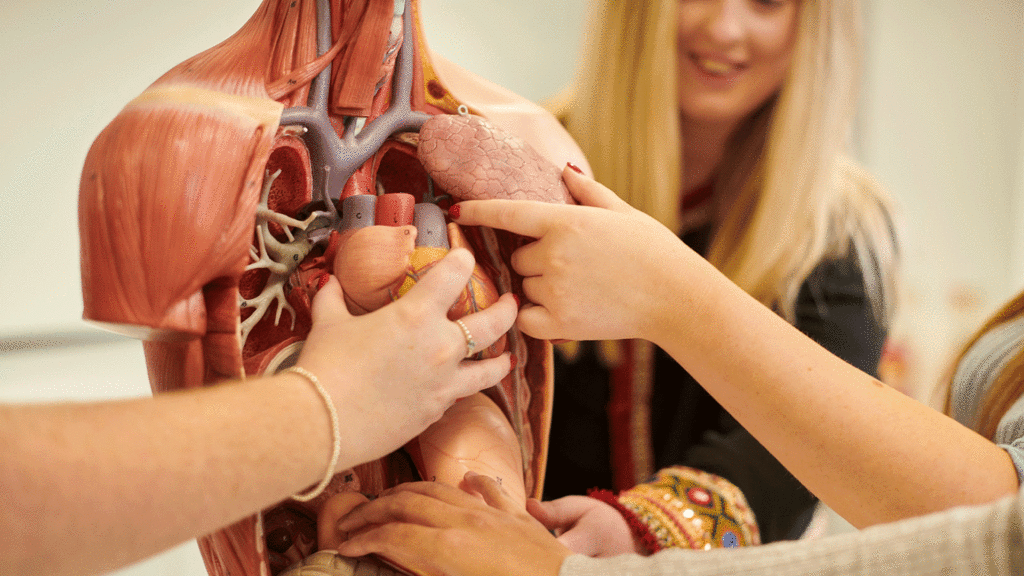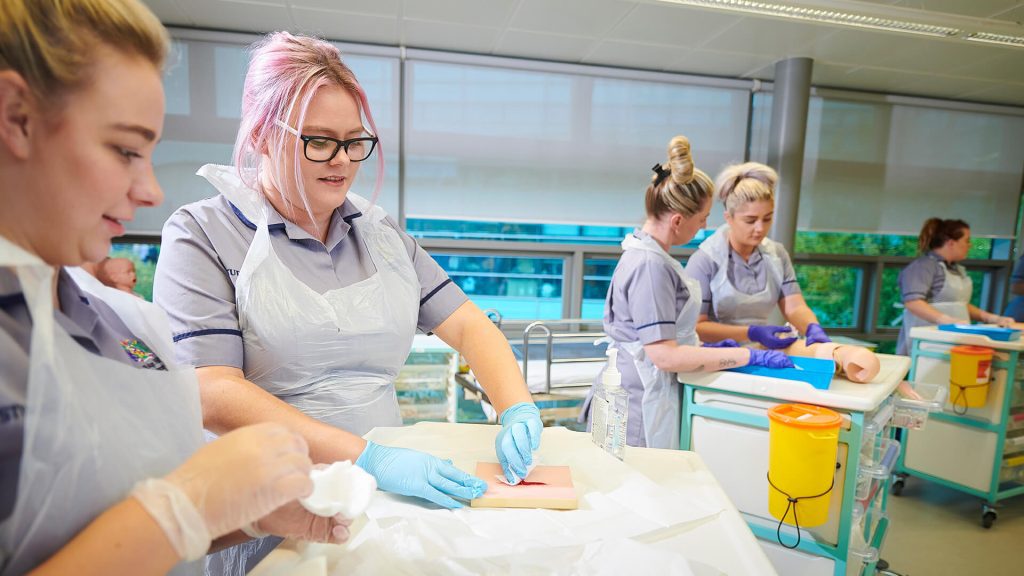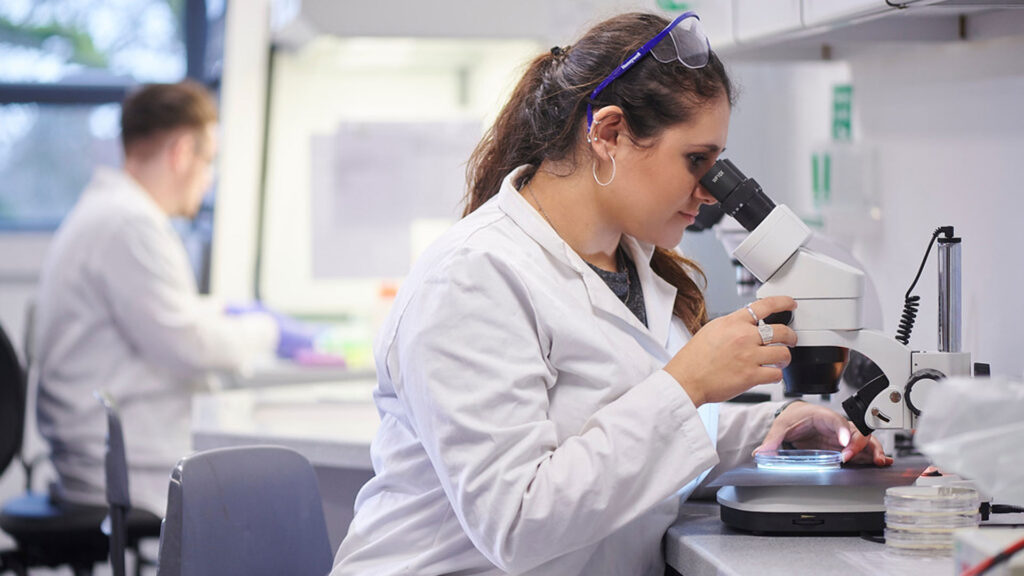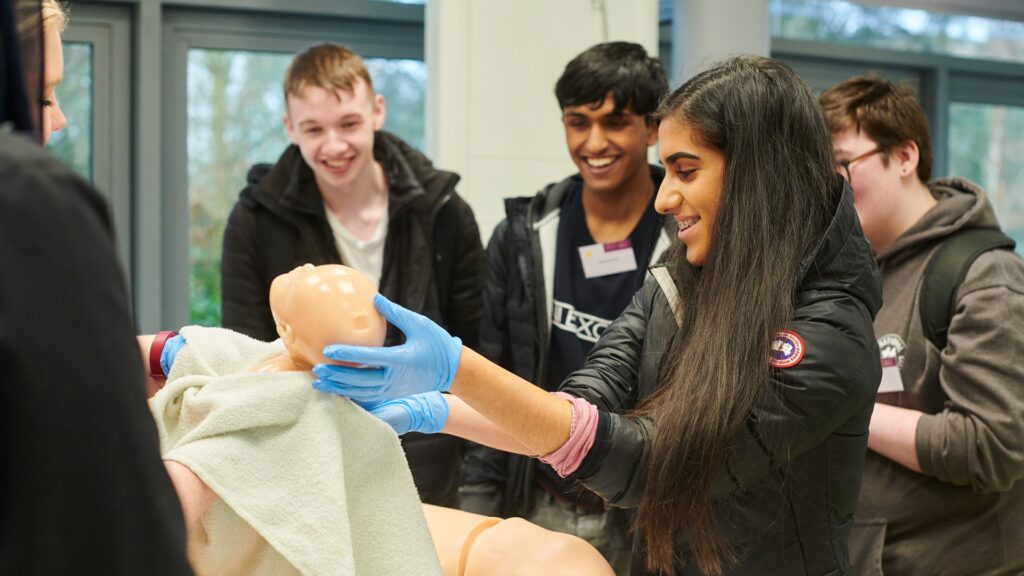Physician Associate Studies MSci (Hons)
UCAS code: BBB9
Learn through a combination of teaching and practical placements. Discover everything you need to know about providing patient care under the supervision of a doctor. Make a difference in an emerging healthcare role as part of a multi-disciplinary team.
Overview
| Course length: | 4 years full-time |
|---|---|
| Start dates: | September 2026 |
| Location: | Edge Hill University |
| Example offers: | ABB (A Level) View full entry criteria |
| Subject(s): | Medicine |
| Faculty: | Health, Social Care and Medicine |
| Department: | Medical School |

Learn through a combination of teaching and practical placements. Work in clinical practice when you graduate. Make a difference in an emerging healthcare role as part of a multi-disciplinary team of health care professionals.
On our 4 year integrated MSci Physician Associate Studies degree, you’ll discover everything you need to know about providing patient care under the supervision of a doctor. In our state-of-the-art Clinical Skills and Simulation facilities, you will learn how to take patient histories and examine patients, conduct clinical examinations, order and interpret diagnostic tests and help make decisions about patient management and therapy.
Upon successful completion of this Masters, you’ll graduate as a flexible and adaptable practitioner. You will also be eligible to sit the Physician Associate national exam, set by Faculty of Physician Associates (FPA). You must pass this exam before you can apply for provisional professional registration with the General Medical Council.
Please note, regulation of physician associates by the General Medical Council is expected. Some requirements are therefore under review and may be subject to change.
Course features
-
Professional practice placements
What you'll study
Adopting a non-modular approach, this programme ensures that you become a competent and proficient Physician Associate and content will be interlinked throughout the programme. You will be fully immersed in learning and understanding how the application of the content joins together, resulting in you becoming a competent Physician Associate practitioner.
Each year will consist of the following themes:
- Human Health and Illness
- The Consultation
- Science Supporting Practice
- Human Populations and Research
- Preparing for Practice.
The number following the theme will indicate the year of study, i.e Human Health and Illness 1 will be in year 1 of the programme. Each theme builds in complexity, enabling you to add to your existing knowledge and apply it each year.
Content and complexity of the curriculum themes will be built up during the course of the degree. You will gain a basic introduction of the core themes and processes. The emphasis in this year will be on biosciences with a particular focus on normal functions and developing communication skills. You will develop your understanding of healthcare structures, professional values, and the diversity of populations. The majority of the teaching will be campus-based. You will also be required to organise a placement with a voluntary organisation, equivalent to five days. This will help aid your understanding of the wider impacts and aspects of healthcare.
Year 2 will build in complexity adding on from the fundamental scientific principles from Year 1. It will also begin to introduce clinical conditions and clinical skills in simulated environments as well as some observational placement experiences. There will be a focus on pathology and the aetiology of disease and you will develop your clinical skills and examination techniques. The majority of the teaching will be campus-based. Clinical experiences in Year 2 will normally be 3 days over 2 weeks spread across the year, ideally in different healthcare settings.
Integration of scientific concepts and clinical knowledge will be increased over the final two years. Following an initial period within the University, your pattern of attendance will vary, but will include blocks of academic teaching, held at the University, as well as clinical placement. You will normally attend an early clinical experience preceding your placement blocks which will allow you to familiarise yourselves with the ward environment at the trust you will be attending for the remainder of the programme. You can expect to normally attend 24 academic weeks, to include academic assessment time. The remaining 22 clinical weeks will normally include the three placements, each of seven weeks duration and one early clinical experience week.
Year 4 will focus on integration of academic and experiential learning that will ensure core competences of the Physician Associate curriculum are met. You will be prepared for the Physician Associate national examination, which is a requirement to be able to practice as a Physician Associate and sits outside of the programme. You can expect to attend 22 academic weeks to include academic assessment time and, normally, 24 clinical weeks made up of four placements, each of six weeks duration. These may be split into individual three week placements to increase your exposure to medical specialities.
How you'll study
The delivery will be mainly on campus including lectures, tutorials, practical classes, and clinical skills and simulation. Later years will include attendance at Clinical Placements working with our local clinical stakeholders. Online resources and teaching will be used to support students learning across the programme.
Timetables will vary per year, but typically you can expect to be in attendance for 4 days per week. During placement years, this would be working hours equivalent to full time, i.e. 37.5 hours per week.
How you'll be assessed
You will be assessed through a combination of written tests, objective structured clinical examinations (OSCEs), presentations, essays and reflective accounts. You will also compile a portfolio to demonstrate your professionalism and achievement of competence.
Who will be teaching you
You will be taught by a range of experienced staff from a variety of medical and scientific expertise. Staff expertise include anatomists, biomedical scientists, physician associates, consultants, doctors, nurses, pharmacists and more.
While on placement you will be supported by an educational supervisor (either a consultant or general practitioner depending on the setting) as well as clinical supervisors within the wider multi-disciplinary team.
Entry criteria
Grades ABB are required at A Level. These must include Biology at Grade A or above, and one other science subject. This must equate to a minimum of 128 UCAS Tariff points.
You will also need at least five GCSEs at Grade C or Grade 4 or above, or equivalent, including Mathematics and English, at the time of application.
Graduates may also be accepted onto this programme with a minimum of a 2:1 classification in their initial degree.
Applicants are required to attend a selection day when they will be interviewed for the course.
You will also be required to apply for a Disclosure and Barring Service (DBS) Enhanced Disclosure indicating that you meet the mandatory criteria of ‘Clearance to Work with Children and/or Vulnerable Adults’.
No transfers will be accepted onto the programme and no deferrals will be accepted for this programme.
English language requirements
Aligned to GMC requirements, applicants for whom English is not their first language must achieve an IELTS overall score of 7.5 and 7 across each testing area component to be on the register. This must be achieved prior to application.
If your current level of English is half a band or one band lower, with no element lower than 4.0, you may want to consider our Pre-Sessional English course.
Fair Entry Criteria
Our new Fair Entry Criteria is a Contextual Admissions Policy that takes an applicant’s personal and educational background into account. This policy will allow eligible applicants to receive up to a two-grade reduction in their entry requirements for this course. Find out more and see if you qualify.
If you join a full time undergraduate degree at Edge Hill University, we will guarantee you the offer of a room in our halls of residence for the first year of your course.
Discover our accommodation
Facilities
The Faculty of Health, Social Care and Medicine offers outstanding facilities for the education and training of health and social care professionals.
The contemporary teaching and learning resources include leading edge clinical skills facilities, an 860-seat lecture theatre, and a variety of teaching rooms and social learning spaces.
Where you'll study
Learning resources
The Clinical Skills and Simulation Centre offers a variety of simulated environments from home, through primary and emergency care, to secondary care and beyond. The flexible and adaptable facilities include a ward environment, operating theatre, an anatomy and ultrasound resource centre, a ‘Better at Home’ suite, clinical skills area and consultation rooms.
You will benefit from access to a wide variety of healthcare equipment, as well as a range of full-body patient simulators that can breathe, talk, have pulses and can simulate a wide range of symptoms and clinical conditions. This will enable you to undertake practical scenarios in realistic settings, providing ideal preparation for professional practice placements and future employment.
Finance
Tuition fees
The University may administer a small inflationary rise in tuition fees, in line with Government policy, in subsequent academic years as you progress through the course.
EU/EEA and Swiss students who have settled or pre-settled status under the EU Settlement Scheme, as well as Irish nationals, may be eligible for the UK tuition fee rate.
Financial support
Please view the relevant Money Matters guide for comprehensive information about the financial support available to eligible UK students joining postgraduate courses at Edge Hill University.
EU/EEA and Swiss students who have settled or pre-settled status under the EU Settlement Scheme may be eligible to apply for financial support. Irish nationals can ordinarily apply to Student Universal Support Ireland (SUSI). Please see our EU student finance page for further details.
Your future career
The aim of this 4-year integrated Masters programme is to provide the conceptual underpinnings and clinical placement learning to enable you to meet GMC competences for working as a Physician Associate.
[GMC regulation of PA is likely to start in 2024.]
Successful completion of this programme will allow students to sit the Physician Associate Registration Assessment, a national examination that is required to work as a PA within the UK.
Upon successful completion of this integrated Masters, you will have the conceptual underpinnings and clinical placement learning to enable you to apply for FPA or GMC registration.












